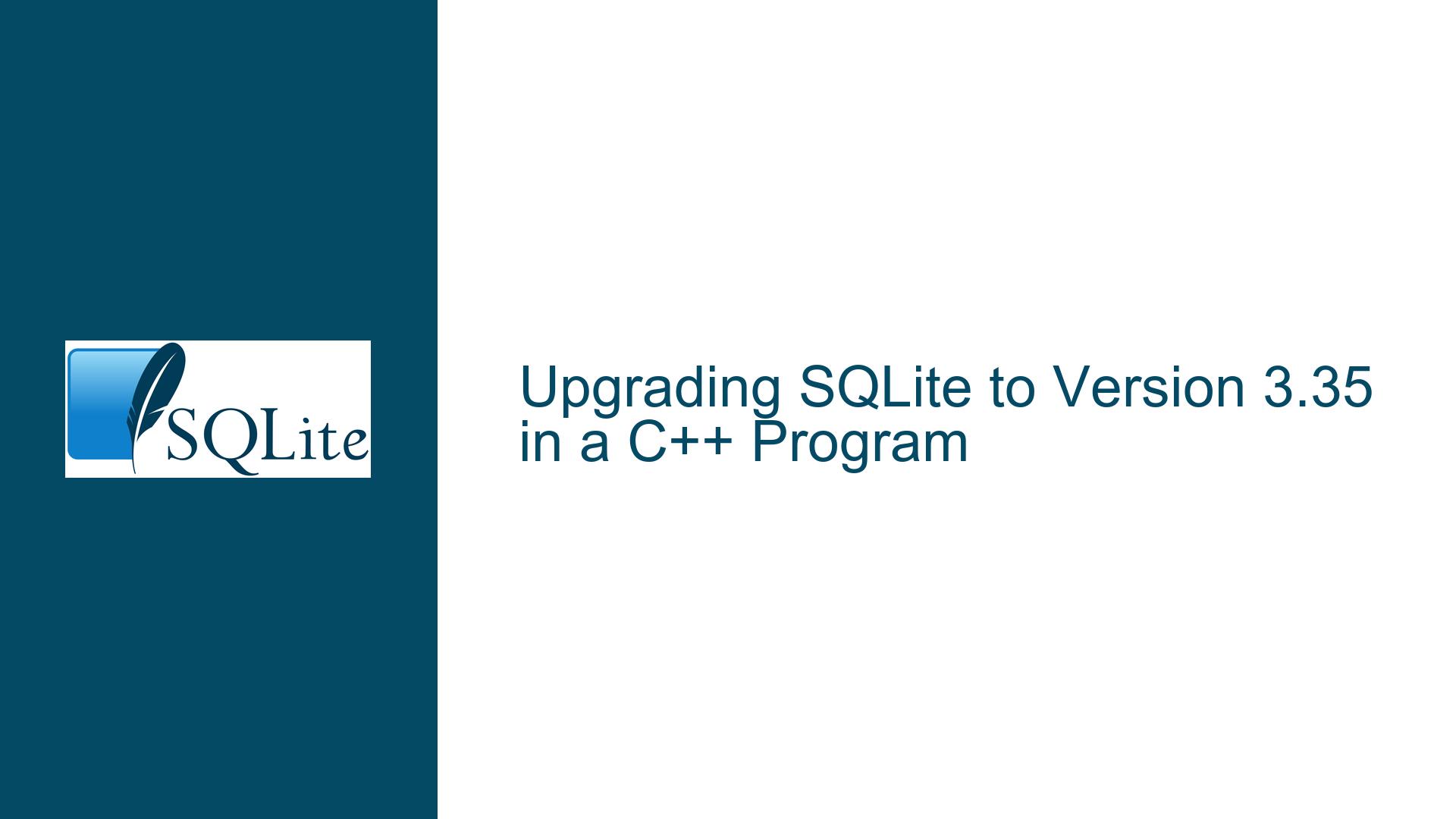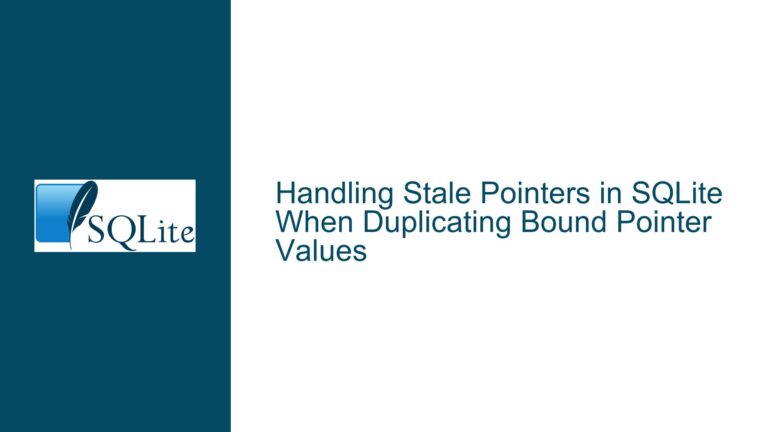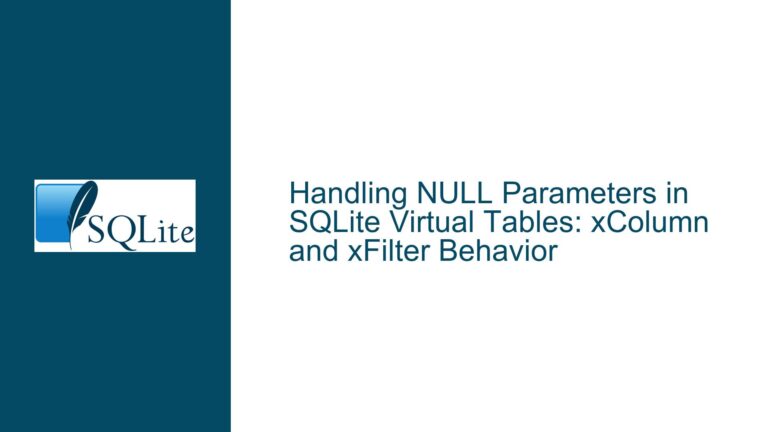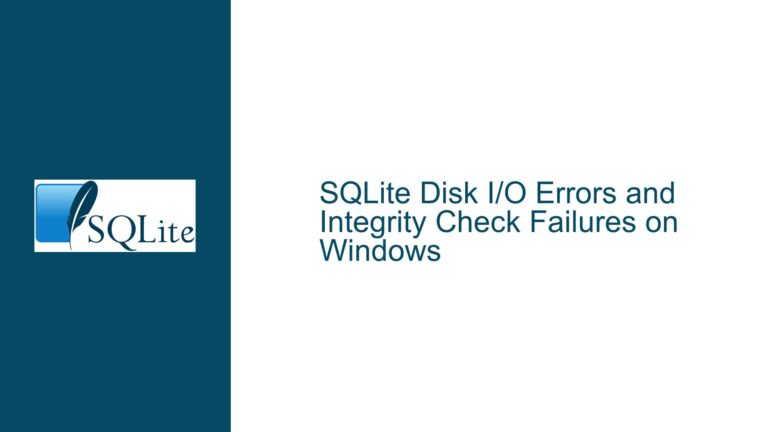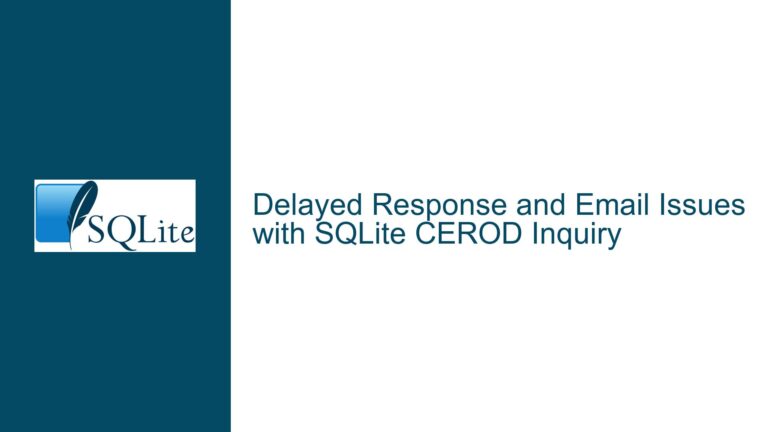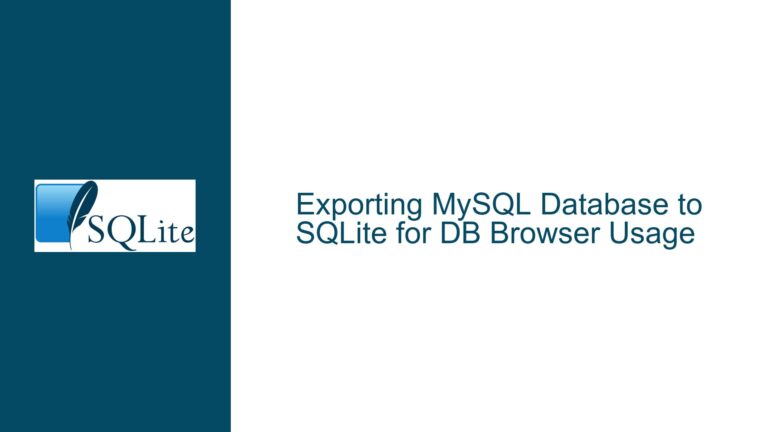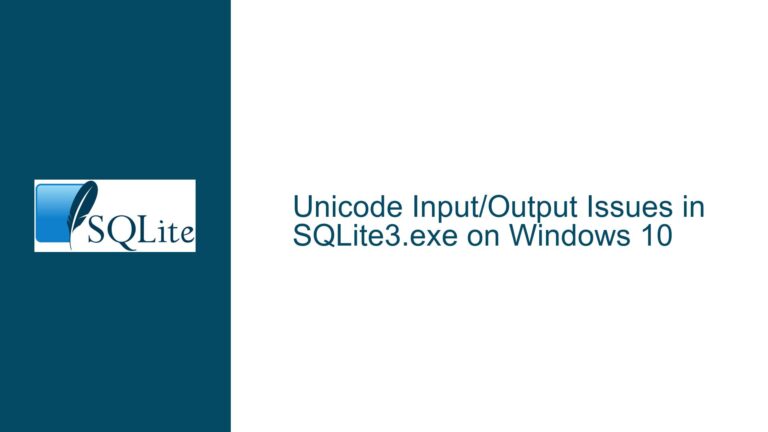Upgrading SQLite to Version 3.35 in a C++ Program
Understanding the Need for SQLite Version 3.35 in C++ Projects
SQLite is a lightweight, serverless, and self-contained SQL database engine that is widely used in embedded systems, mobile applications, and desktop software. Version 3.35 of SQLite introduced a highly anticipated feature called the RETURNING clause, which allows developers to retrieve modified rows directly within INSERT, UPDATE, and DELETE statements. This feature simplifies code and improves efficiency by reducing the need for additional queries to fetch updated or inserted data.
In the context of a C++ project, integrating the latest version of SQLite can be crucial for leveraging new features, performance improvements, and bug fixes. However, the process of upgrading SQLite in a C++ program is not always straightforward, especially when dealing with system-wide installations, package managers, and dependencies. The core issue here revolves around ensuring that the C++ program uses SQLite version 3.35 or later, rather than an older version like 3.31.1, which may be installed system-wide by default.
The challenge lies in the fact that many Linux distributions, including Ubuntu, do not immediately update their package repositories to include the latest versions of SQLite. This delay can prevent developers from accessing new features unless they take proactive steps to upgrade SQLite manually. Additionally, the C++ program must be configured to link against the correct version of the SQLite library, which requires careful handling of include paths, library paths, and linker flags.
Why System Package Managers May Not Provide SQLite 3.35
One of the primary reasons developers encounter difficulties when trying to upgrade SQLite in their C++ projects is the reliance on system package managers like apt on Ubuntu. Package managers are designed to provide stable, tested versions of software that are compatible with the operating system and other installed packages. However, this stability often comes at the cost of delayed updates for individual software components.
In the case of SQLite, the version available in the official Ubuntu repositories may lag behind the latest release on the SQLite website. For example, while SQLite 3.35 was released in March 2021, Ubuntu 20.04 LTS (a long-term support release) still ships with SQLite 3.31.1 by default. This discrepancy occurs because LTS distributions prioritize stability over cutting-edge features, and updating core libraries like SQLite can introduce compatibility issues with other software.
Another factor contributing to the delay is the process by which new versions of software are added to package repositories. After a new version of SQLite is released, it must be reviewed, tested, and packaged by the maintainers of the distribution. This process can take weeks or even months, depending on the complexity of the update and the resources available to the maintainers.
To overcome these limitations, developers must take control of the SQLite installation process by downloading and building the latest version directly from the SQLite website. This approach ensures access to the newest features and improvements but requires a deeper understanding of the build and linking process in C++ projects.
Steps to Upgrade and Integrate SQLite 3.35 in a C++ Program
The process of upgrading SQLite in a C++ program involves several steps, each of which must be executed carefully to ensure a successful integration. Below is a detailed guide to achieving this:
1. Downloading the Latest Version of SQLite
The first step is to obtain the source code for SQLite 3.35 or later. This can be done by visiting the official SQLite website (https://sqlite.org) and navigating to the download page. The source code is available as a precompiled amalgamation, which is a single C file (sqlite3.c) and a single header file (sqlite3.h). This format simplifies the build process and ensures compatibility with a wide range of compilers and platforms.
2. Building SQLite from Source
Once the source code is downloaded, the next step is to compile it into a shared or static library that can be linked with the C++ program. The following commands demonstrate how to build SQLite on a Linux system:
# Extract the source code
tar xzf sqlite-amalgamation-3350000.tar.gz
cd sqlite-amalgamation-3350000
# Compile the source code into a shared library
gcc -shared -o libsqlite3.so -fPIC sqlite3.c
# Alternatively, compile the source code into a static library
gcc -c sqlite3.c -o sqlite3.o
ar rcs libsqlite3.a sqlite3.o
The -shared flag generates a shared library (libsqlite3.so), while the -c flag produces an object file (sqlite3.o) that can be archived into a static library (libsqlite3.a). The choice between shared and static libraries depends on the specific requirements of the project.
3. Updating the C++ Project Configuration
With the SQLite library built, the next step is to update the C++ project to use the new version. This involves modifying the include paths, library paths, and linker flags in the build system. For example, if using g++ directly, the following commands can be used:
# Compile the C++ program and link against the new SQLite library
g++ -I/path/to/sqlite-amalgamation-3350000 -L/path/to/sqlite-amalgamation-3350000 -o my_program my_program.cpp -lsqlite3
The -I flag specifies the directory containing sqlite3.h, while the -L flag specifies the directory containing libsqlite3.so or libsqlite3.a. The -lsqlite3 flag instructs the linker to link against the SQLite library.
4. Verifying the SQLite Version in the C++ Program
After updating the project configuration, it is essential to verify that the program is using the correct version of SQLite. This can be done by querying the SQLite version at runtime using the sqlite3_libversion() function:
#include <sqlite3.h>
#include <iostream>
int main() {
std::cout << "SQLite version: " << sqlite3_libversion() << std::endl;
return 0;
}
Compiling and running this program should output SQLite version: 3.35.0 or later, confirming that the upgrade was successful.
5. Handling Potential Issues
During the upgrade process, several issues may arise, such as conflicts with the system-wide SQLite installation or missing dependencies. To avoid these problems, it is recommended to use a local installation of SQLite that is isolated from the system libraries. This can be achieved by specifying the full path to the custom SQLite library in the linker flags:
g++ -I/path/to/sqlite-amalgamation-3350000 -o my_program my_program.cpp /path/to/sqlite-amalgamation-3350000/libsqlite3.so
Additionally, developers should ensure that the LD_LIBRARY_PATH environment variable is set correctly when running the program:
export LD_LIBRARY_PATH=/path/to/sqlite-amalgamation-3350000:$LD_LIBRARY_PATH
./my_program
By following these steps, developers can successfully upgrade SQLite in their C++ projects and take advantage of the latest features and improvements. This approach provides greater control over the development environment and ensures compatibility with the specific requirements of the project.
